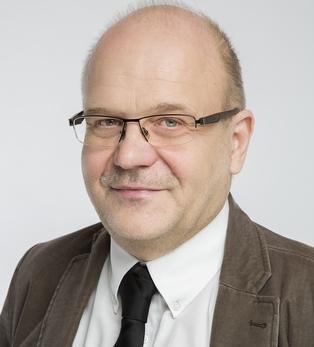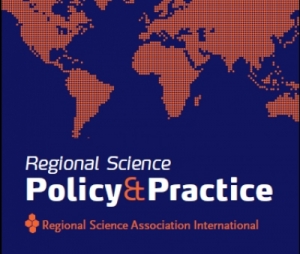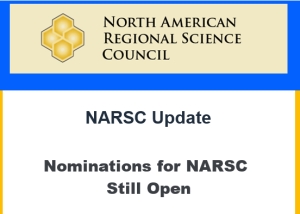Archives
Elisabete Martins
NARSC 2023 is coming up!
|
|
Call for Papers, The 28th Pacific Conference of the RSAI in 2024
Call for Papers, The 28th Pacific Conference of the RSAI in 2024.
EXCO (Daegu Exhibition & Convention Center), Daegu, South Korea, August 5–7, 2024.
Abstract submission opening on Dec 1, 2023
Abstract submission deadline on Mar 15, 2024
More information: http://prsco2024.krsa83.or.kr/
-----------------
Call for Submissions, PRSCO Award for Best Paper by a Young Regional Scientist 2024.
The Pacific Regional Science Conference Organization (PRSCO) offers a Best Paper Award annually. The Award is aimed at encouraging young regional scientists within the Asia-Pacific region to participate in research within the PRSCO community and to achieve research excellence. PRSCO now invites submissions for the 2024 Award.
Papers submitted for the Best Paper Award should be presented to the 28th Pacific Conference of the RSAI in 2024 at South Korea on August 5-7, 2024.
The LOC of the PRSCO 2024 will waive the registration fee for the Prize winner.
Eligible authors who wish to submit a paper to the PRSCO Best Paper competition should email a pdf copy of their paper to the PRSCO Executive Secretary, Soushi Suzuki, This email address is being protected from spambots. You need JavaScript enabled to view it., by no later than June 1, 2024.
More information: http://www.lst.hokkai-s-u.ac.jp/~soushi-s/prsco/PRSCOAwards.html
------------------
Call for Applications, Higano Award for Outstanding Service to PRSCO 2024.
We are pleased to announce that we are now accepting applications for the Higano Award for Outstanding Service to PRSCO 2024 (The Higano Award).
Please submit your nomination along with the nomination form to the PRSCO Secretariat by January 31, 2024 via email <This email address is being protected from spambots. You need JavaScript enabled to view it.>.
The Pacific Regional Science Council Organization (PRSCO) annually presents the Higano Award for outstanding contributions to PRSCO. The award recognizes a member or friend of PRSCO (individual person) who has made an outstanding long-term contribution to the development and organization of regional science, particularly in the Asia-Pacific region and internationally beyond the regional level, and may be presented to up to two individuals each year on a calendar year basis. The recipient will be presented with the award by the PRSCO President or his/her nominee at the PRSCO 2024 in South Korea.
More information: http://www.lst.hokkai-s-u.ac.jp/~soushi-s/prsco/PRSCOAwards.html#HA2023
TRSA ABC & SAS events during the NARSC Conference on November 15-18, 2023, San Diego (USA)!
? ANNOUNCEMENT ?
‼️JOIN US‼️
Join us at The Regional Science Academy (TRSA) Special Events during the NARSC Conference on November 15-18, 2023, San Diego (USA)!
Dear TRSA Members, RSAI Friends, and Everyone,
Next week, the NARSC conference will take place in San Diego, USA; it promises to be an exciting event. On the occasion of the NARSC conference, The Regional Science Academy (TRSA) is thrilled to present two special events:
- ABC (Advanced Brainstorm Carrefour) Session:
- Topic: Does AI Stand for 'Auctor Intellectualis’ or 'Artificial Intelligence'? The Potential of AI for Regional Science.
- Date: Wednesday, November 15, 2023
- Time: 10:45 am - 3:45 pm (local time)
Final ABC Program: see Details on page 19 of NARSC programme à https://www.narsc.org/newsite/wp-content/uploads/2023/11/2023_NARSC_final_nov1.pdf
- Special Academic Session (SAS), includingRoundtable on NEG:
- Topic: Is the NEG (New Economic Geography) Still Relevant in 2023 for America?
- Date: Friday, November 17, 2023
- Time: 7:55 am - 5:00 pm (local time)
- Speakers: Paul Krugman (Nobel Laureate), Tony Venables, Carlos Moreno, Roberta Capello, Laurie Schintler and many other esteemed speakers.
Final SAS Program: see Details on page 43 of NARSC programme à https://www.narsc.org/newsite/wp-content/uploads/2023/11/2023_NARSC_final_nov1.pdf
- Great Minds in Regional Science Lecture byJohn Tschangho Kim (University of Illinois at Urbana-Champaign) on: The Scientific Significance ofEd Mills
- Date: Friday, November 17, 2023
- Time: 4:00 pm - 4:45 pm (local time)
- Final SAS Program: see Details on page 44 of NARSC programme à https://www.narsc.org/newsite/wp-content/uploads/2023/11/2023_NARSC_final_nov1.pdf
To attend these events (either online or onsite), please inform us by contacting Karima Kourtit at This email address is being protected from spambots. You need JavaScript enabled to view it..
We hope to welcome you to these engaging sessions, whether in person or virtually.
For more details and to explore the full event programs, please visit: https://www.narsc.org/newsite/wp-content/uploads/2023/11/2023_NARSC_final_nov1.pdf
Cordially yours,
ERSA Monthly E-news - October 2023
|
|
|
|
|
|
|
|
|
|
|
|
|
|
|
|
|
|
|
|
|
|
|
|
|
|
|
|
|
|
|
|
|
|
|
|
RSPP Call for Papers | Special Issue: Rethinking the Regional Development Opportunities and Challenges in Southern Africa

Regional Science Policy & Practice (RSPP)
Call for Papers Special Issue: Rethinking the Regional Development Opportunities and Challenges in Southern Africa
Guest Editors
Tazviona Richman Gambe - University of the Free State, South Africa (This email address is being protected from spambots. You need JavaScript enabled to view it.)
Joel Chaeruka - University of Zimbabwe, Zimbabwe; This email address is being protected from spambots. You need JavaScript enabled to view it.
Regional development has been a key focus area in the post-independence era of African countries. Various scholars have focused on regional socio-economic development policies (Rambanapasi & Darkoh, 1998; Rakodi, 1990; Harrison & Turok, 2017), regional development strategies, and regional disparities that persist in African countries, especially focusing on infrastructure provision and politics of difference (Todes & Turok, 2018; Raftopoulos, 2019). Regions are complex spaces that are inherently fluid and make it difficult to have a one-size-fits-all approach to their development. With the increasing attention and focus on sustainability, resilience, and inclusivity espoused in the sustainable development goals, it becomes critical to interrogate how regions are constrained and the opportunities they provide in enhancing these aspirations.
Several issues have been inherent in regions that affect successful regional development in recent years. Among these have been issues of climate change that significantly affect the socio-ecological status of regions, thus bringing new complexities into these spaces and calling for new approaches and methodologies for understanding these problems. Key questions also emerge mainly on the issue of food access and security in regional development (Arnalte-Mur et al., 2020). This is a key issue considering the persisting food insecurities bedeviling most regions in Southern Africa. Yet, regional development planning tools, methods, data, and policies have not been fully developed and comprehended. For example, regional planning in some African countries has remained mainly on paper with little practical application (Landau, 2011). Challenges behind this abound. Apart from the lack of development funds, complexities of operating regionally (Odero, 2001), and unavailability of replicable regional development tools and methodologies, the acute shortage of regional data has affected regional development practice (PlanAfric, 2000; Potts, 2018; Gambe et al., 2022).
Notwithstanding this, scholars have pointed to the opportunities available to revive regional development efforts. These include the re-conceptualisation of regional planning as a powerful tool with the potential to address regional development problems in Southern Africa, renew the interest amongst practitioners to think, undertake research, and operate regionally (Odero, 2001; Scholvin et al., 2022), training regional scientists in tertiary institutions with the skillset required in regional development practice, creating databases with a regional focus, formulating and implementing regionally-based policies, and undertaking rigorous research on Southern Africa’s experiences in regional development and future prospects (Chazireni, 2003).
The special issue themes include but are not limited to the following:
- Theoretical and philosophical approaches to understanding regional development
- Socio-spatial justice and regional development
- Regional development strategies and policies
- Regional local economic development
- Regionalism and indigenous knowledge
- Regional development and urban mobility (transport systems)
- Integrating food systems and regional development
- Climate change and regional development planning
- SDGs and regional development
- 4IR and regional development
- Data management and regional development
- Regional analysis tools, methods, and models
- Urbanisation – opportunities and challenges
- Regional migration challenges and opportunities
Important Dates:
Deadline for Submission of Full Papers: October 15, 2025
Manuscript submission information:
All submissions must be original and may not be under review elsewhere. All manuscripts will be submitted via the Regional Science Policy & Practice online submission system (https://www.editorialmanager.com/rspp/). Authors should indicate in the cover letter that the paper is submitted for consideration for publication in this special issue “Rethinking the Regional Development Opportunities and Challenges in Southern Africa”, otherwise, your submission will be handled as a regular manuscript.
References
- Arnalte-Mur, L., Ortiz-Miranda, D., Cerrada-Serra, P., Martinez-Gómez, V., Moreno-Pérez, O., Barbu, R., ... & Šūmane, S. (2020). The drivers of change for the contribution of small farms to regional food security in Europe. Global Food Security, 26, 100395.
- Chazireni, E., (2003) The spatial dimension of socio-economic development in Zimbabwe. University of South Africa (Dissertation)
- Gambe, T. R., Geyer, H. S., & Horn, A. (2022). Economic resilience of city-regions in Southern Africa: An exploratory study of Zimbabwe. Regional Science Policy & Practice, 14(2), 438–455. https://doi.org/10.1111/rsp3.12500
- Harrison, J., & Turok, I. (2017). Universities, knowledge and regional development. Regional Studies, 51(7), 977-981.
- Landau, L. (2011). Contemporary migration to South Africa: a regional development issue. World Bank Publications.
- Odero, K. (2001). Review of Zimbabwe's experience with regional development planning. Working Paper. https://doi.org/10.13140/RG.2.1.1144.1042
- PlanAfric (2000) Issues and problems rural district planning in Zimbabwe: A case study. International Institute for Environment and Development. http://www.jstor.com/stable/resrep18121.10
- Potts, D. (2018). Urban data and definitions in sub-Saharan Africa: Mismatches between the pace of urbanisation and employment and livelihood change. Urban Studies, 55(5), 965-986.
- Raftopoulos B (2019) Zimbabwe: Regional politics and dynamics. In Oxford Research Encyclopedia of Politics
- Rakodi C (1990) Policies and preoccupations in rural and regional development planning in Tanzania, Zambia and Zimbabwe. In Simon, D. (ed), Third world regional development: A reappraisal, pp. 129-153. London: Paul Chapman.
- Rambanapasi C. O., & Darkoh M. B. K., (1998) A general overview of regional planning in the SADC region. Journal of African Research and Development, 1997/98, Vol. 27/28 (1997/98), pp 1-44
- Scholvin, S., Turok, I., Visagie, J., & Diez, J. R. (2022). Regional value chains as new pathways to development?. Area Development and Policy, 7(2), 177-186.
- Todes, A., & Turok, I. (2018). Spatial inequalities and policies in South Africa: Place-based or people-centred?. Progress in Planning, 123, 1-31.
NARSC 2023 is only weeks away!
|
|
Two research fellows positions at Department of Architecture, Built Environment, and Construction Engineering of Politecnico di Milano
At the Department of Architecture, Built Environment, and Construction Engineering of Politecnico di Milano, the regional and urban economics research group is looking for two research fellows. The two fellows will join our research activities in the field of regional and urban economics, with particular reference to the themes of the spatial aspects of digital transition and the reconfiguration of global value chains. Appreciated skills include a keen interest in learning, in a possible higher education experience abroad, and in a career in research. The selection is related to the activation of an annual research grant, with the possibility of renewal, through a public selection.
For any request of information, please write This email address is being protected from spambots. You need JavaScript enabled to view it., This email address is being protected from spambots. You need JavaScript enabled to view it., and This email address is being protected from spambots. You need JavaScript enabled to view it..
In Memoriam: Attila Varga (1958-2023)
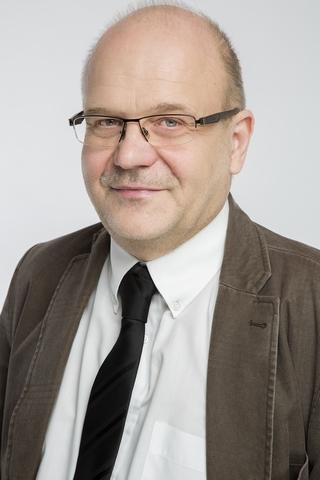 We are saddened to announce that Attila Varga passed away at the age of 66, on 23 October 2023, after a long illness.
We are saddened to announce that Attila Varga passed away at the age of 66, on 23 October 2023, after a long illness.
Attila Varga was born on 18 June 1958 in Tatabánya, Hungary, where he completed his primary and secondary education. He began his university studies in 1979 at the JPTE Faculty of Economics, Pécs, where he graduated in 1983 and obtained his doctorate in 1989. He received his PhD degree from the Department of Economics, University of West Virginia (USA) in 1997. From 1998 to 2001, he worked at the Austrian Academy of Sciences and was a Senior Research Fellow at the Vienna University of Economics and Business Administration. After his return to Hungary, he habilitated and received a doctorate from the Hungarian Academy of Sciences in 2006 and was appointed as a university professor.In 2019, he became the member of the Hungarian Academy of Sciences.
His academic career took off in the United States in the 1990s, where his main research area was knowledge flows, the spatial diffusion of innovations from universities and research institutes. His highly cited articles have been published in leading journals, and the book version of his doctoral thesis "University research and regional innovation: a spatial econometric analysis of scientific technology transfers" has been a great success. Since the 2000s, he has been focusing on the spatial determinants of economic growth in Hungary, the European Union and Turkey, using a large scale spatial economic impact analysis model developed under his leadership. The results of his research have been used in economic policy, with suggestions focusing on R&D and human capital development, entrepreneurship and innovation network policies, investment support for smart specialisation and infrastructure development. To date, he is one of the most cited Hungarian economists. His work has been recognised with the 2018 Academic Prize of the Hungarian Academy of Sciences and the Order of Merit of Hungary. In 2023 he recieved the prestigious ERSA Prize in Regional Science.
As a university professor, he contributed significantly to the development of his alma mater, the University of Pécs. Between 2006 and 2012 he was the director of the Department of Economics and Regional Sciences at the Faculty of Business and Economics, UP and founded the Regional Innovation and Entrepreneurship Research Center. In 2010, he took over the leadership of the Doctoral School of Regional Politicy and Economics, which he has developed into a prestigious programme with many international connections. Under his leadership, this research center and the doctoral school became the background of a vivid academic community that contributed significantly to the Faculty of Business and Economics as well as the Hungarian and international regional science community. This community has launched and supported the academic careers of many researchers over the years.
Attila has always been renowned for his commitment to scientific discovery and has never been deterred by hard work. His absence is already felt by friends, close colleagues, students and colleagues. We will cherish his memory as one of the leading researchers in regional science, a great professor, mentor and friend. Shall he rest in peace.
Dr. Tamás Sebestyén
Department of Economics and Econometrics
University of Pécs, Hungary
Assistant/Associate Professor position in Geospatial Health Analysis at UNC Charlotte
Assistant/Associate Professor position in Geospatial Health Analysis at UNC Charlotte
The Department of Geography and Earth Sciences (https://geoearth.charlotte.edu/) in the College of Humanities & Earth and Social Sciences at the University of North Carolina at Charlotte invites applications for a tenured or tenure-track appointment at the rank of Assistant or Associate Professor specializing in Geospatial Health Analysis to begin on August 15, 2024. We are seeking a dynamic and broadly trained geospatial health scientist whose expertise focuses on health disparities, challenges and/or solutions from a geographic perspective.
Requirements for this position include a Ph.D. degree in Geography, Geographic Information Science, Urban Planning, a health-related field, or another discipline related to geospatial health analysis, awarded by the date of appointment. Candidates will be expected to demonstrate their ability (1) to contribute to the department's undergraduate, masters, and Ph.D. focus areas in geography, urban and regional analysis, human-environment interactions, and geographic information science and/or geospatial health; (2) to build a cutting-edge, externally funded research program in geospatial health analysis; (3) to engage in interdisciplinary collaboration; and (4) to effectively teach undergraduate and graduate courses in geography, geographic information science, and/or their area of specialization. Applicants at the Assistant Professor level are encouraged to demonstrate how their academic and/or professional experience have prepared them for sustainable success in the above four areas. Applicants at the Associate Professor level should demonstrate a record of sustained excellence in the above four areas.
Candidates should submit the following to https://jobs.charlotte.edu/ [Position Number 6905]: (1) cover letter; (2) research statement; (3) teaching statement; (4) a curriculum vitae; (5) one to three representative publications, and (6) contact information (including email addresses) for at least three professional references. Review of applications will begin on December 1, 2023 and will continue until the position is filled.
More details are attached. For more information, contact search committee chair Dr. Colleen Hammelman, (This email address is being protected from spambots. You need JavaScript enabled to view it.).
WRSA: Fall 2023 Newsletter + Reminder for "2024 Annual Meeting" in Monterey, CA
Dear WRSA Members and Friends,
The Fall 2023 Newsletter is attached and contains everything you'll need to start planning our 63rd Annual Meeting in Monterey, California from Feb 11th, 2024 to Feb 14th, 2024. For those who want the information now, here are the key details:
Paper Submission: Papers should be submitted to the WRSA website by the extended due date, November 30. Only full papers (draft format acceptable) will be accepted. The program review committee will review and invitations will be sent to the accepted papers. Draft papers are sufficient for the November deadline, so long as we have a complete version in hand by January 15th 2024.
Hotel Reservations: Our negotiated daily room rate is $229 plus applicable taxes and a waived resort fee ($33 of the resort fee is waived for our group). Some perks of the hotel stay include free self and valet parking, complimentary standard wireless wifi in guestrooms, and access to the 24-hour Fitness Center. The hotel is honoring our special room rate three days prior to and three days following our meetings (Feb 8th through Feb 17th), based on availability. The room reservation can be made via this link, or by calling 831-372-1234 and asking for the Western Regional Science Association 2024 group rate (Group code: G-WR24).
Please note: After January 10, 2024, or as soon as our block fills, the hotel will no longer honor our special room rate! Be sure to book early!
Student Conference Assistants: WRSA is seeking several students to assist with meeting registration. In exchange for 8-10 hours of volunteering at the registration desk, students will receive a full refund of their registration fees (worth $150, to be processed following the meeting) and potentially discounted staff rooms at the conference hotel. Student volunteers should stay at the conference hotel during the WRSA annual conference. Email me at This email address is being protected from spambots. You need JavaScript enabled to view it. if you're interested.
Session Chairs and Paper Discussants: Planning to come to Monterey but won’t be presenting a paper? We are always VERY happy to assign you a session chair or paper discussant duties if you’re willing. Just email me at This email address is being protected from spambots. You need JavaScript enabled to view it. to let me know of your preferences and availability.
Please feel free to contact me at This email address is being protected from spambots. You need JavaScript enabled to view it. with any questions.
And please do circulate/post the attached Call for Papers!
Let your colleagues know what a great meeting WRSA is...
The Way Academic Life Should Be...
All the best,
Jaewon Lim
Program Chair, 2024 Annual Meeting
Executive Director, WRSA
About Us
The Regional Science Association International (RSAI), founded in 1954, is an international community of scholars interested in the regional impacts of national or global processes of economic and social change.

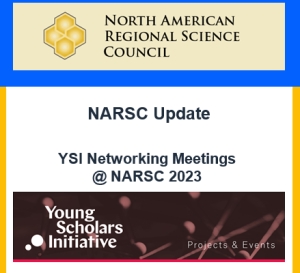


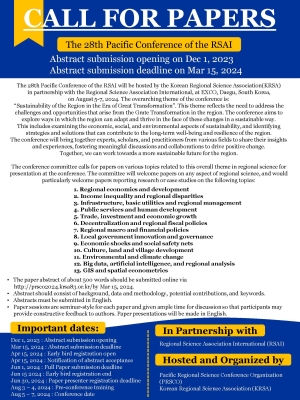
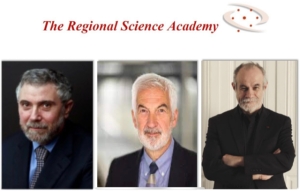
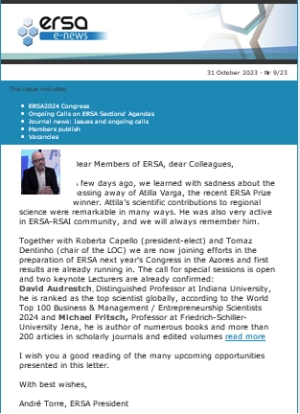

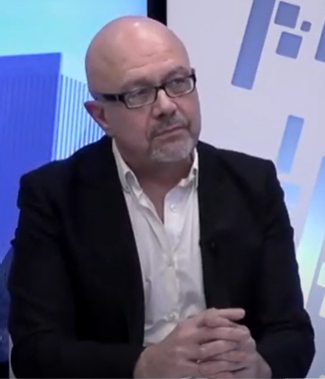 Dear Members of ERSA, dear Colleagues,
Dear Members of ERSA, dear Colleagues,


